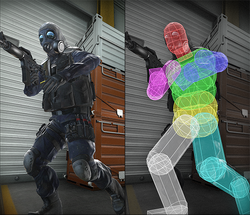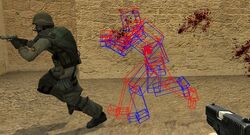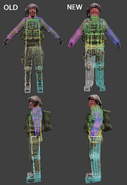No edit summary Tag: rte-source |
No edit summary |
||
| (23 intermediate revisions by 7 users not shown) | |||
| Line 1: | Line 1: | ||
| + | {{stub}}[[file:Csgo hitboxes new.png|thumb|250px|''Global Offensive'' hitboxes]] |
||
| ⚫ | |||
| − | [[File:Lag compensation.jpg|thumb|256px|An example of how internet latency causes a player's actual hitboxes to deviate from their respective player model positions.]] |
||
| − | [[File:CSGO_SWAT_hitbox.png|thumb|An example of the hitbox system, viewed with the [[Counter-Strike: Global Offensive]] SDK. ]] |
||
A '''hitbox''' is a representation of the hit detection system used by the [[Counter-Strike series|''Counter-Strike'' series]]. |
A '''hitbox''' is a representation of the hit detection system used by the [[Counter-Strike series|''Counter-Strike'' series]]. |
||
| + | ==Overview== |
||
| − | Different |
+ | Different hit regions represent the different areas of the body, such as the [[Headshot|head]], which influence the damage of a shot. |
| − | In early ''Counter-Strike'' games, the boundaries for the individual hitboxes |
+ | In early ''Counter-Strike'' games, the boundaries for the individual hitboxes were outside their respective body parts, making the hitboxes larger than the actual model. Starting with the {{GOPatch|September 15, 2015}} update of ''[[Counter-Strike: Global Offensive]]'' however, the boundaries for the individual hitboxes were placed almost entirely inside their respective body parts by incorporating capsules instead of boxes. |
| − | However, due to the complexities of the networking code, this |
+ | Hitboxes in ''Counter-Strike: Source'' can be displayed using the [[console command]] {{code|sv_showimpacts 1}} when cheats are enabled. For ''Global Offensive'' sv_showlagcompensation 1 shows the hitboxes. However, due to the complexities of the networking code, this may not accurately represent how hits are actually determined, particularly in ''Source'' and ''Global Offensive'' where the networking code is more complex. More recent versions of the Source engine have disabled the sv_showhitboxes command. |
| + | |||
| + | In ''Counter-Strike: Global Offensive'' only, if a single bullet passes through several hitbox areas with different damage multipliers, then it will inflict the highest amount of damage in the different damages.<ref>[https://youtu.be/CbftQTBHSlA CS:GO: Can you block bullets?] - 3kliksphilip</ref> On the other hand, in ''Counter-Strike'' and ''Counter-Strike: Source'', bullets will not pass through several hitbox areas and thus the damage inflicted will be only at the first hitbox area the bullet hits. |
||
| − | ===Hitbox damage multipliers=== |
||
{| class="wikitable" |
{| class="wikitable" |
||
| + | ! colspan="2" | Hitbox Multipliers |
||
|- |
|- |
||
! Location !! Damage |
! Location !! Damage |
||
|- |
|- |
||
| − | | [[Headshot|Head]] || 400% |
+ | | [[Headshot|Head]] || 400% |
|- |
|- |
||
| − | | Chest & Arm || 100% |
+ | | Chest & Arm || 100% |
|- |
|- |
||
| − | | Stomach || 125% |
+ | | Stomach || 125% |
|- |
|- |
||
| − | | Leg || 75% |
+ | | Leg || 75% |
|} |
|} |
||
| + | Buying [[Kevlar]] only protects the player's Chest & Arm and Stomach areas. Buying [[Helmet]] extends the protection to the player's head. The legs are never protected. |
||
| − | {{Gameplay}} |
||
| + | |||
| + | ==Lag Compensation== |
||
| + | {{Construction}}[[File:Lag compensation.jpg|thumb|250px|An example of lag compensation.]] |
||
| + | Networking delay can negatively impact players' game experience. One moving low ping player may see themselves having moved inside cover, while another high ping player sees them still outside of cover. Even at low ping, the basic network structure causes an average of 30-40 milliseconds of action delay on other players' view.<ref>[https://youtu.be/pHi2DfSFFpk Counter Strike Global Offensive Netcode Analysis] - Battle(non)sense</ref> |
||
| + | |||
| + | To remedy the lag, lag compensation is implemented to improve the experience of high players. Without lag compensation, in the above example, if the high ping player fires at where they see the low ping player, the server will not register a hit because the server instead sees that the low ping player has moved inside cover. With lag compensation, the server factors in latency on the tick the high ping player fires, and checks an earlier tick to see if the player hits the low ping player on that tick. This gives an advantage to high ping players, as low ping players may take damage even after they moved into cover.<ref name= DevinDTV>[https://youtu.be/6EwaW2iz4iA How It Works: Lag compensation and Interp in CS:GO] - DevinDTV</ref> |
||
| + | |||
| + | However, lag compensation does not compensate if a player fires first. This gives an advantage to low ping players since their shot is more quickly transferred to the server and the server registers it first.<ref name= DevinDTV/> |
||
| + | |||
| + | With or without lag compensation, interpolation of animations causes small amounts of delay.<ref name= DevinDTV/> |
||
| + | |||
| + | ==Gallery== |
||
| + | <gallery> |
||
| + | Hitboxes comparison old new.png|Comparison old hitboxes and new "hitbubbles". |
||
| + | </gallery> |
||
| + | |||
| ⚫ | |||
| + | {{gameplay}} |
||
[[Category:Gameplay]] |
[[Category:Gameplay]] |
||
| + | [[Category:Global Offensive gameplay]] |
||
Revision as of 04:41, 14 May 2019

|
This article/section is a stub. This article/section is short and lacking information. You can help the Counter-Strike Wiki by expanding it. |

Global Offensive hitboxes
A hitbox is a representation of the hit detection system used by the Counter-Strike series.
Overview
Different hit regions represent the different areas of the body, such as the head, which influence the damage of a shot.
In early Counter-Strike games, the boundaries for the individual hitboxes were outside their respective body parts, making the hitboxes larger than the actual model. Starting with the September 15, 2015 update of Counter-Strike: Global Offensive however, the boundaries for the individual hitboxes were placed almost entirely inside their respective body parts by incorporating capsules instead of boxes.
Hitboxes in Counter-Strike: Source can be displayed using the console command sv_showimpacts 1 when cheats are enabled. For Global Offensive sv_showlagcompensation 1 shows the hitboxes. However, due to the complexities of the networking code, this may not accurately represent how hits are actually determined, particularly in Source and Global Offensive where the networking code is more complex. More recent versions of the Source engine have disabled the sv_showhitboxes command.
In Counter-Strike: Global Offensive only, if a single bullet passes through several hitbox areas with different damage multipliers, then it will inflict the highest amount of damage in the different damages.[1] On the other hand, in Counter-Strike and Counter-Strike: Source, bullets will not pass through several hitbox areas and thus the damage inflicted will be only at the first hitbox area the bullet hits.
| Hitbox Multipliers | |
|---|---|
| Location | Damage |
| Head | 400% |
| Chest & Arm | 100% |
| Stomach | 125% |
| Leg | 75% |
Buying Kevlar only protects the player's Chest & Arm and Stomach areas. Buying Helmet extends the protection to the player's head. The legs are never protected.
Lag Compensation
| This article/section is under construction. While this article/section is still under construction, you can help this page by adding information. |

An example of lag compensation.
Networking delay can negatively impact players' game experience. One moving low ping player may see themselves having moved inside cover, while another high ping player sees them still outside of cover. Even at low ping, the basic network structure causes an average of 30-40 milliseconds of action delay on other players' view.[2]
To remedy the lag, lag compensation is implemented to improve the experience of high players. Without lag compensation, in the above example, if the high ping player fires at where they see the low ping player, the server will not register a hit because the server instead sees that the low ping player has moved inside cover. With lag compensation, the server factors in latency on the tick the high ping player fires, and checks an earlier tick to see if the player hits the low ping player on that tick. This gives an advantage to high ping players, as low ping players may take damage even after they moved into cover.[3]
However, lag compensation does not compensate if a player fires first. This gives an advantage to low ping players since their shot is more quickly transferred to the server and the server registers it first.[3]
With or without lag compensation, interpolation of animations causes small amounts of delay.[3]
Gallery
References
- ↑ CS:GO: Can you block bullets? - 3kliksphilip
- ↑ Counter Strike Global Offensive Netcode Analysis - Battle(non)sense
- ↑ 3.0 3.1 3.2 How It Works: Lag compensation and Interp in CS:GO - DevinDTV
| ||||||||||||||||||||

